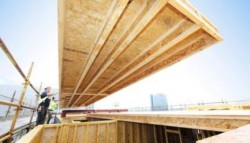A perhaps little anticipated knock-on effect of the on-going Covid-19 pandemic is the global return to disposable commodity items—for safety against virus transmission. For today’s increasingly environmentally conscious society, it might feel like we’ve taken three steps forward, and suddenly, two steps back.
But our climate change goals have not gone anywhere. In June 2019, the UK became the first major economy to pass a net zero emissions law, requiring the UK to bring all greenhouse gas emissions to net zero by 2050.
The effects of 2020 don’t have to be permanent. The contribution of the construction industry can also be one of the most invaluable, as an industry which currently contributes up to 45% of all greenhouse gasses in the UK, on the journey to still reach net zero by 2050.
However, we also must acknowledge that gearing up again to the way that we were working prior to Covid-19 is not possible for the safety of our construction workers. Following government guidelines on safe distances between people to reduce virus spread as much as possible means that some aspects of the construction industry will be able to progress much quicker, while others may not.
Roofing, for example, is one of those that has the potential to lead the way during this time, as it takes place outdoors and is fairly secluded, with no social interaction necessary throughout.
So, with this in mind, how can the roofing industry also lead the way in meeting the sustainability goals for construction?
The first step is to continue to uphold sustainability goals in each construction project through the use of sustainable materials and practices. Timber, when properly managed, is the only 100% sustainable renewable material.
The second consideration is the method of building. Offsite construction has the potential to significantly contribute to the UK’s climate target of reaching net-zero by 2050 and plays an important part of the government’s strategy for this. Offsite construction can be a key player in driving emissions down through reducing the transportation of components to and from the site, limiting the production of landfill waste, limiting embodied emissions and delivering more sustainable structures across their lifecycles.
MEDITE SMARTPLY has recently developed three products for roofing that are ideal for use in both offsite and timber frame construction: SMARTPLY ULTIMA OSB4, SMARTPLY MAX OSB3 and SMARTPLY MAX FR B OSB3, which is fire-rated. Crucially, they are all made with FSC® certified timber from sustainably managed forests—as is standard across everything manufactured by MEDITE SMARTPLY.
These have been developed following years of research into the most demanding structural applications, including those in offsite construction, to ensure these boards are ready for anything. Manufactured with state of the art ContiRoll® technology, they are highly engineered to be smooth and consistent throughout, and crucially can be produced in largescale formats of up to 2.8m wide by 7.5m long and up to 40mm thick. This allows entire roofs or sides of buildings to be sheathed with minimal effort and time spent, making them model solutions for offsite construction or for ensuring a project is still completed on time, even with fewer boots on the grounds.
As part of the wider SMARTPLY range, they also boast a manufacturing formula with no added formaldehyde, for the safety of those who will work with the products. This, as well as their sustainability credentials are also positive factors that can contribute environmental building standard credits such as BREEAM, LEED and The WELL Standard, for any project.
Even as the construction industry evolves to adapt to a ‘new normal’ in the post-lockdown world, there should be no reason why we should abandon our sustainability targets. Let’s do the right thing: let’s lead the way in roofing, in construction, and in sustainability, with SMARTPLY roofing products.









